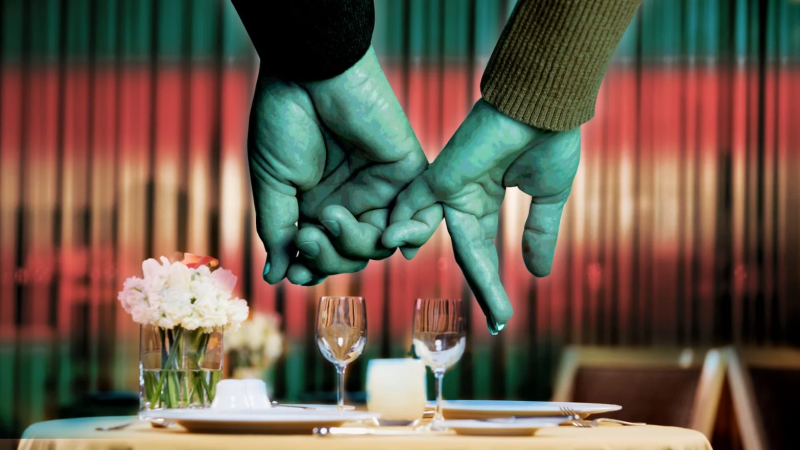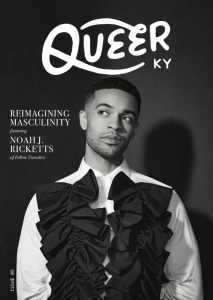THINKING QUEERLY: Is it hard to date a trans person?
This is a question that the cisgender (or non-trans) people I have dated are often asked by other cis people. It is an example of a well-intended microaggression, a question or comment that is not malicious, but that nonetheless reveals the speaker’s bias toward (in this case) trans people.
Please note! You can be supportive of trans people, or of a trans/cis couple, and still hold unconscious biases toward trans people. It doesn’t mean you’re a bad person. It just means you still have learning, or unlearning, to do.
In my experience, the question “Is it hard to date a trans person?” is usually prompted by one or more of the following biases.
BIAS #1: “Trans people are not ‘real’ men or ‘real’ women. So by dating a trans person you are settling for a counterfeit.”
This bias rests on a misunderstanding of gender as synonymous with sex (i.e. genitals and chromosomes). But sex and gender are two different things!
To use an analogy: if your sex is an artwork, your gender is your interpretation of that artwork. When I look at Van Gogh’s Starry Night, I am deeply comforted, whereas my friend is deeply saddened. Neither interpretation is wrong; they are just different. Incidentally, I am trans and my friend is cis. And much like our interpretations of Starry Night, our genders are not strictly determined by external factors. Rather, both are the outcome of a combination of external and internal factors: our bodies, yes, the painting, yes, but also: our upbringings, our memories, our experiences, our vocabularies, our belief systems, our desires, and so on. Because both of us experience ourselves as men, we are both men.
It follows that a preference for certain body parts is not the same as a preference for a certain gender. So you’re gay and you prefer dick? Cool. There are trans men with dicks, some natural and some prosthetic, that you might be interested in. You’re bisexual and you prefer vaginas? Word. There are trans women and trans men you might be compatible with! People can also prefer, or be exclusively attracted to, a particular gender without being exclusively attracted to particular parts. A lesbian, for example, might be exclusively attracted to women, but have no preference when it comes to her sexual partner’s genitals.
To sum up: trans men are men, trans women are women. You aren’t “settling” if you date a trans man, a trans woman, or a nonbinary person. You are only “settling” if you date someone—whether trans or cis—who doesn’t treat you well, or who you aren’t that into.
BIAS #2: “Trans people are mentally or emotionally unstable.”
Some of us are, some of us aren’t—just like cis people. Trans people are at higher risk for mental health issues such as anxiety and depression than cis people. But this is due to our marginalized status, not to our transness itself.
On the other hand, because we have endured so much push-back for simply existing as ourselves, trans people are also some of the strongest, most resilient, and most resourceful motherfuckers you could date. We know how to take care of ourselves and each other. We value ourselves, our chosen lives, our chosen families, in ways that only we can.
BIAS #3: “Trans people are unhappy with their bodies or their parts. So dating a trans person 1) is a downer, or 2) means that you will never get to have sex.“
It is true that many trans people experience dysphoria: feelings of discomfort or distress due to the (alleged) “mismatch” between one’s sex and gender. However, many of us are also fine with our bodies. And for many of us, what causes dysphoria is not our parts in and of themselves, but rather the way cisgender people (including doctors and therapists) talk about those parts: as if there is a mismatch. As if sex does determine gender. As if it’s wrong for someone of our gender to have the parts that we have. For many of us, our dysphoria is manageable. Some of us experience gender euphoria, but little to no gender dysphoria. Every trans person is unique.
If a trans person does experience dyspohria, enjoyable sex will require some preliminary conversations about boundaries, triggers, and preferences. But this is not unique to trans people. Anyone with any history of sexual or physical trauma (i.e. most people) will have boundaries and triggers that their partner needs to be aware of. Trauma aside, communication about sexual boundaries and preferences shouldn’t be a chore. It’s a necessary part of sex as a consensual act, not to mention it makes the sex better and more enjoyable for everyone involved.
I would also like to point out that trans people offer something in the sack that many cis people can’t. No, I’m not talking about fetishes. I’m talking about a lifetime of having to “think outside the box” when it comes to sex and pleasure. We have had to adapt, evolve, problem solve, and get creative in ways that most cis people haven’t, which are skills they don’t teach you in sex ed.
4. “Trans people (and their partners) are treated poorly by the rest of society. ”
This is actually legitimate. Trans people, and their partners, are often treated poorly by others in society. Yes, you will deal with other cis people’s nonsense if you date a trans person. You’ll likely have to deal with some offensive comments and invasive questions about your sexuality, your partner’s body, and god knows what else. You may even lose some transphobic friends or family members. Welcome to our life.
But dating a trans person is also awesome, in that trans people are, not to brag, really fucking self-aware and socially-aware. We kind of have to be, to question the one thing that 99% of the world accepts as given: your gender. So if you’re cis, dating a trans person can really open your eyes to the social construction of gender, and everything affiliated with this social construction (so basically everything). So proceed with caution: dating a trans person is awesome, but it’s not for the weak of intellect.
So is dating a trans person hard? Yes, to the extent that entangling your life and emotions with another human being’s life and emotions is hard. The same goes for dating a cis person. But the obstacles that trans people have to overcome in order to exist as our authentic selves have earned us a wisdom, strength of character, courage, and a softness that’s uniquely ours. We have a lot to offer a partner. Certainly we have as much to offer as anyone else.












Leave a Reply
Want to join the discussion?Feel free to contribute!